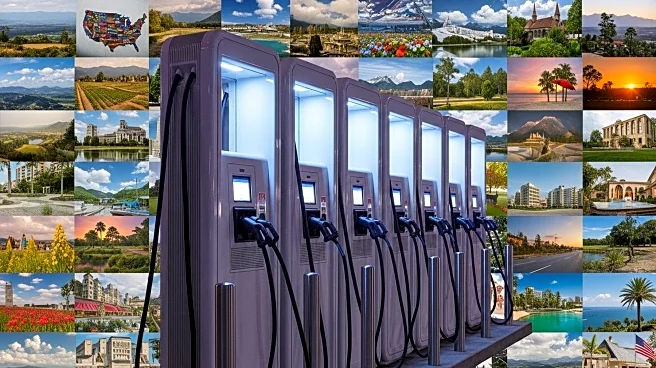What's Happening?
The cost of driving an electric vehicle (EV) compared to gasoline-powered cars varies significantly across the United States, influenced by regional electricity and gasoline prices. Research by Francesca Paris highlights that while EVs generally offer lower fuel costs, this advantage is contingent on local conditions. For instance, driving an EV 100 miles costs approximately $5.26, whereas hybrids like the Toyota Prius cost slightly more at $6.15, and gasoline cars cost around $12.80. However, using Level 3 DC fast chargers can increase EV costs to $15.62 per 100 miles. States with low electricity costs and high gasoline prices, such as Washington, offer the greatest economic benefit for EV drivers. Conversely, states like Connecticut, with expensive electricity and cheaper gasoline, diminish the cost advantage of EVs.
Why It's Important?
The varying costs of EV charging across the U.S. have significant implications for consumer decisions and the broader adoption of electric vehicles. In regions where electricity is expensive, the economic incentive to switch from gasoline to electric vehicles is reduced, potentially slowing the transition to cleaner transportation. This disparity also highlights the need for improved infrastructure, such as more affordable and accessible charging stations, particularly in urban areas where home charging may not be feasible. The economic impact extends to the automotive industry, influencing market demand and potentially guiding policy decisions on energy pricing and infrastructure development.
What's Next?
As the U.S. continues to navigate the transition to electric vehicles, stakeholders including government agencies, utility companies, and urban planners may need to address the infrastructure challenges that affect EV adoption. This includes expanding the availability of affordable public charging stations and incentivizing off-peak electricity usage to reduce costs. Additionally, policy shifts may be necessary to support the development of renewable energy sources, which could lower electricity costs and enhance the economic appeal of EVs. The ongoing debate over energy pricing and infrastructure investment will likely shape the future landscape of transportation in the U.S.
Beyond the Headlines
The discussion around EV costs also touches on broader environmental and societal issues. The shift to electric vehicles is a critical component of reducing carbon emissions and combating climate change. However, the economic barriers highlighted by regional cost disparities underscore the complexity of achieving widespread adoption. Furthermore, the maintenance advantages of EVs, such as reduced service needs and longer-lasting components, offer potential long-term savings for consumers, which could influence purchasing decisions beyond immediate fuel costs.










